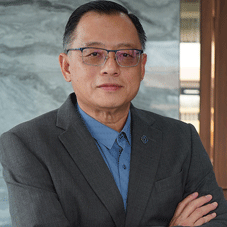
Lim Wai Hoong
CEO
In the dynamic landscape of business, leadership is the rudder that steers an organization toward success. Good leadership is not merely about making decisions, it’s about inspiring a collective vision, fostering innovation, and guiding teams to achieve both short-term objectives and long-term growth. A strong leader cultivates an environment where talent flourishes and businesses thrive, setting the foundation for progress and prosperity. Effective leadership shapes an organization’s culture, drives performance, and plays a crucial role in overcoming the challenges of an ever-evolving marketplace. In Laos, a country experiencing rapid economic growth, one leader who has made significant contributions to both business and society is Lim Wai Hoong, CEO of BIC Bank Lao.
Lim’s journey is a testament to the power of perseverance and dedication. Starting from humble beginnings as a clerical staff member, he worked his way up to become a key figure in the Lao financial sector. Along the way, he earned a Master’s in Business Administration while balancing his professional responsibilities. His leadership has been widely recognized, earning him prestigious accolades, including serving as the President of the Malaysia Chamber of Business. In 2019, Lim received a certificate of appreciation from the Bank of Lao PDR for his valuable contributions to the social economy of Laos. This recognition from the Governor of the Bank of Lao PDR further highlights his significant impact on the country's development. Lim Wai Hoong’s story is a powerful example of how leadership, commitment, and hard work can transform both an individual and the broader community. Let’s read on.
What strategies have you implemented to ensure effective risk management within the organization?
I believe that driving effective risk management starts with establishing a strong tone from the top. As a leader, I make it a priority to encourage risk-aware decision-making at every level of the organization. By setting an example through my own actions and decisions, I create an environment where employees understand the importance of managing risks proactively. Additionally, I place great emphasis on employee training, regularly educating staff on our risk policies, ethics, and emerging threats. This continuous learning process ensures that everyone is equipped to identify and address risks effectively. A solid risk culture, along with comprehensive training, is essential for driving risk management in any organization. It creates a collective understanding and commitment to safeguarding the organization’s future.
How would you define your leadership approach? What principles or methodologies do you follow in your role as a leader?
My leadership approach has always centered on management by example and a hands-on style.
I firmly believe that a leader should embody the values they expect from their team. For instance, punctuality is a value I hold in high regard, and I ensure that I am always on time for meetings and events, setting a clear standard for others to follow. I also strive to set clear expectations, especially when it comes to work ethic, problem-solving, and collaboration. It’s essential to define these standards so that the team knows exactly what is expected of them.
My leadership approach has always centered on management by example and a hands-on style
I prioritize being visible and actively participating in the day-to-day activities of my team. Whether it's joining meetings, participating in discussions, or reviewing projects, I make sure to engage directly with my team to foster a sense of unity and involvement. This hands-on approach allows me to provide real-time coaching, offering immediate guidance as tasks are being carried out. I see this as teaching by doing, which I believe is one of the most effective ways to instill knowledge and skills. I’ve learned much from great leaders who embraced similar methods. For example, Nelson Mandela, who worked alongside his fellow prisoners during apartheid to build solidarity, and Steve Jobs, who obsessively reviewed product designs with his engineers. These leaders showed that true leadership is about rolling up your sleeves, leading by example, and being actively involved with your team at every level.
How do you stay informed about the latest industry trends to guide your organization toward the future?
I make continuous learning a priority by attending seminars, webinars, and workshops to stay updated on new technologies, management practices, and industry developments. Networking also plays a crucial role in expanding my knowledge and gaining insights from peers and experts. Additionally, I keep myself informed by regularly reading industry news, publications, and following relevant social media channels and online communities. This multifaceted approach ensures I am always aware of the latest trends and developments in my field.
What is the future destination you are heading towards, and based on your extensive experience in the industry, what advice would you offer to aspiring leaders looking to follow a similar path?
As I move toward the digital era, my focus is on staying ahead of technological advancements while embracing new opportunities. To aspiring leaders, I advise maintaining integrity, upholding high moral character, and committing to continuous learning. It’s essential not only to stay updated on developments within your industry but also to understand the broader global changes shaping the future. By doing so, you can ensure both personal growth and effective leadership in a rapidly evolving world.
Lim Wai Hoong, CEO, BIC Bank Lao
A visionary leader, Lim Wai Hoong has risen from clerical staff to CEO of BIC Bank Lao. Recognized for his contributions to Laos’ social economy, he has earned accolades such as serving as President of the Malaysia Chamber of Business.



.png)